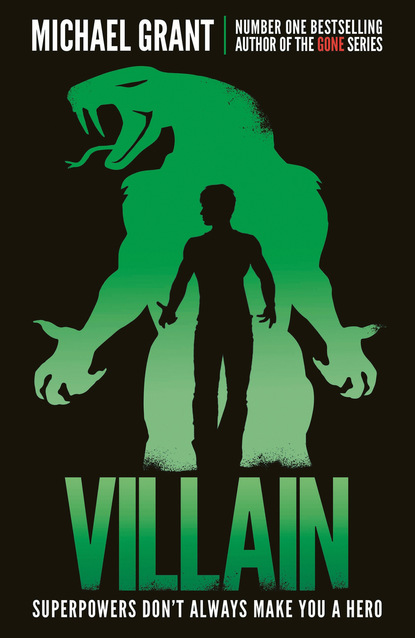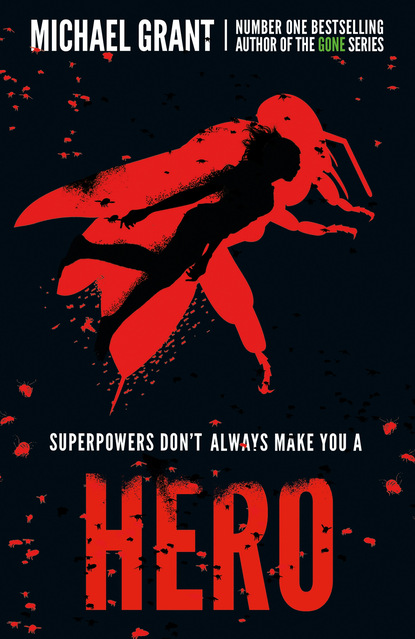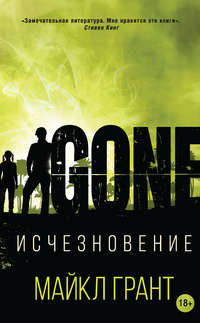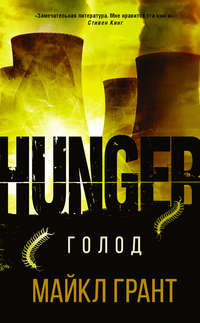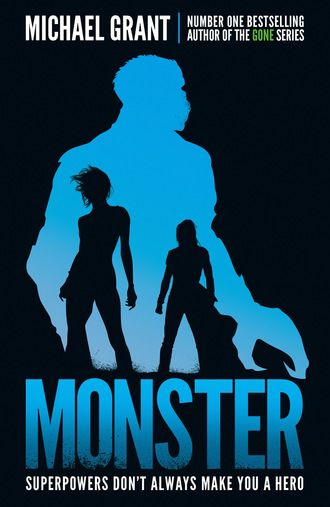
Полная версия
The Monster Series



First published in Great Britain in 2017
by Electric Monkey, an imprint of Egmont UK Limited
The Yellow Building, 1 Nicholas Road, London W11 4AN
Published by arrangement with HarperCollins Children’s Books, a division of HarperCollins Publishers, New York, New York, USA
Text copyright © 2017 Michael Grant
The moral rights of the author have been asserted.
First e-book edition 2017
ISBN 978 1 4052 8483 7
Ebook ISBN 978 1 7803 1766 3
www.egmont.co.uk
A CIP catalogue record for this title is available from the British Library
All rights reserved. No part of this publication may be reproduced, distributed, or transmitted in any form or by any means, or stored in a database or retrieval system, without the prior written permission of the publisher.
Stay safe online. Any website addresses listed in this book are correct at the time of going to print. However, Egmont is not responsible for content hosted by third parties. Please be aware that online content can be subject to change and websites can contain content that is unsuitable for children. We advise that all children are supervised when using the internet.

For all the GONE fans,
the best fans in the world
CONTENTS
Cover
Title Page
Copyright
Dedication
PART ONE: ORIGIN STORIES
Shade Darby, Four Years Earlier
1: THE MEET CUTE
2: DROPPING THE NAME TAG
ASO-2
3: THE COMMITTING OF CRIMES
4: BAD START, WORSE FINISH
5: A PERFECT SPECIMEN
6: HANGING WITH DEAD PEOPLE
ASO-4
7: AN UNHAPPY GUINEA PIG
8: DADDY ISSUES
9: ON THE RUN
10: TURNING WHITE TO RED
ASO-5
Meanwhile, in Scotland
11: A REALLY BAD COMMUTE
12: BEING USED
13: ALL DONE BEING USED
PART TWO: HERO, VILLAIN, MONSTER
Interstice
14: A CAREER SETBACK
15: A NICE TALK
16: SHADE VS KNIGHTMARE
17: BATTLE OF THE LIGHTHOUSE
Aboard the Okeanos Explorer
18: GOING HOME
19: MEET THE PSYCHOPATH
PART THREE: ROUGH BEASTS
20: FIRST ON THE SCENE
21: COOKING DRAKE
22: FIRE, WATER AND SHADE DARBY
23: LATE TO THE PARTY
24: THERE’S ALWAYS SOMETHING WORSE
25: SOMETHING WORSE
26: INNOCENT BYSTANDER
27: HEROES, VILLAINS, MONSTERS
28: CONSEQUENCES
29: AFTERMATH
Back series promotional page
About the Author
Shade Darby, Four Years Earlier
“IT’S THE MONSTER!” Shade Darby cried out, speaking to no one in particular.
The monster was a girl who appeared to be in her teens, but was in reality mere days old. She was known the world over from her first recorded appearance during which she had torn off a man’s arm and eaten it. While the man watched in shock and agony.
The girl, the creature, the monster, now covered from head to toe in blood, stood in the middle of the highway.
There was no traffic on the highway. There hadn’t been in a year. That was how long the dome had sat astride the 101 at Perdido Beach, creating the world’s longest detour.
One day the dome had simply appeared, a perfect sphere twenty miles in diameter which extended down beneath the ground as far as it rose into the sky. That dome was centered on a nuclear power plant, but encompassed vast tracts of forest, hills, farmland, ocean, and almost all of the town of Perdido Beach, California, which lay at the extreme southern end.
The instant the dome appeared (impenetrable, opaque, and utterly impervious to drills, lasers, and shaped explosive charges), every single person fifteen years of age and older had been ejected.
Ejected.
They had popped up on the beach, in the road, on lawns, in homes, in people’s swimming pools. Some had been injured or killed, suddenly materializing in front of speeding trucks. Some had drowned, finding themselves without warning a mile out to sea. A few had materialized in solid objects, with one man skewered by a lamppost, like a human shish kebab. And some had been turned inside out, for reasons that no one had understood then or later.
One of the first scientists to be called to the scene to explain this incredible, impossible, and yet terrifyingly real phenomenon was Dr. Heather Darby of Northwestern University, in Evanston, a suburb of Chicago. She had soon realized that this would be no overnight jaunt and that the study of the dome would take months if not years.
So Dr. Heather Darby had flown her daughter out to stay with her in the temporary housing complex hastily erected by the military.
For Shade Darby, thirteen years old, it had been wonderful. First and foremost, there was the beach. Evanston had a beach, but it did not compare to the long stretches of golden sand south of Perdido Beach. Then there was the excitement of being in a sprawling, makeshift compound teeming with soldiers and police and scientists and media and, of course, the Families of the captives in the dome.
The Families. People capitalized it because everyone knew what that meant. They’d been all over TV, the Families. Hysterical at first, then angry, and finally depressed and resigned and hopeless.
But most of all for Shade there was the awe-inspiring, overwhelming presence of the dome itself. It was a mystery so profound that no human had yet come close to understanding it, not even her mother.
Finally, after many months, a decision had been reached in secret to explode a small nuclear device—that was the official term; normal people called it a bomb—at the desert-fronting eastern edge of the dome. It was the very first thing to have any impact whatsoever on the dome. And the effect it had was . . . well, the greatest show the world had ever seen, because suddenly the dome had gone . . . transparent.
When the dome first appeared and ejected everyone fifteen and over, it was speculated that all those under that age were still inside the dome, but no one knew for sure. Many thought the dome might be a solid, a massive ball, like the world’s biggest ball bearing, just sitting there. But most believed that approximately three hundred and thirty-two children, aged fourteen down to newborn, were trapped inside.
Oh, the theories!
The theory Shade Darby liked best was that they were all inside, all those children. She wanted to believe that some benign power had taken care of them. Shade, like most people, hoped that they were all somehow okay.
Then the dome had become transparent, and the world seemed to freeze in place as every television and news website on Earth stared through cameras mounted on TV trucks, drones, helicopters and satellites—not to mention millions of individual smartphones—at what lay revealed.
The children definitely were inside. They were not okay. They were not at all okay. They were filthy, starved, scarred in body and mind, armed with everything from spiked baseball bats, lead pipes, and kitchen knives, to home-made flamethrowers, shotguns, and automatic weapons.
And there were far fewer than three hundred and thirty-two still alive.
They stared out through the dome, those wild children, and the world had stared back.
A savage, descent-of-man, dystopian madness.
And of course an instantly trending Twitter and Instagram meme. #Dome #PerdidoBeach #LOTF #BubbleKids. And then, when those inside had managed to communicate through scribbled notes held up for the cameras, the world learned what those on the inside called it and a new hashtag was born: #FAYZ.
The mordant acronym FAYZ: Fallout Alley Youth Zone.
But the dome was not the only warping of reality, for it soon became clear that some of those inside, not all, but some, had acquired fantastic powers. Supernatural powers. Comic book powers. Powers they did not always use for good.
Shade had been there every day since the dome had gone transparent, watching rapt and often appalled. Her mother had standing orders for Shade to stay away from the dome, but Shade was the daughter of two scientists, and curiosity ran very deep in her genetic make-up. So each day, as soon as she was sure her mother was occupied, Shade would wrap her too-noticeable auburn hair into a bun and cover it with a cap, then sneak from the grim barracks down to the dome, joining the throng of families.
It was the Families that kept it all from being mere spectacle. The Families would hold up signs. Do you know Monica Cowell? Is James Tipton safe? Please tell me if my son, my daughter, my sister, my grandchild is alive and safe.
#NameTheDead.
Many of the parents and grandparents learned that the one they had been praying for had been dead for months. Dead from starvation. Dead from animal attack. Dead from suicide.
Dead from murder.
A girl who called herself the Breeze, a skinny, puckish girl who could move at impossible speeds, wrote signs and held them up to be seen and photographed.
Sorry, your son Hunter is dead.
Sorry, your daughter Carla died eight months ago.
Sorry. Sorry. Sorry.
Life had not been peaceful inside what the media and the authorities and even the President of the United States called the Perdido Beach Anomaly. PBA. PBA lacked the bitterly dry humor of FAYZ, which solemn adults thought too glib.
Anomaly: something that deviates from what is standard, normal, or expected. Synonyms: oddity, peculiarity, abnormality, irregularity, inconsistency, incongruity, aberration, quirk, rarity. “PBA” was safe and bloodless and sounded scientific, but Shade knew that all it signified was, “We don’t know.”
Theories? Lots of theories. But understanding? There was none of that.
Shade had watched it all, heard the cries of grief, seen the tear-streaked faces. It was sickening but fascinating, and impossible to look away from.
Inside the dome, frightened children huddled close to their side of the transparent force field. Two very different worlds stared at each other, like monkeys in a cage, though which side were the monkeys was not at all clear.
Outside the dome, parents held up signs to be read by six-year-olds armed with butchers’ cleavers and gnawing on raw fish. Ten-year-olds sat sullen and listless, drinking from whiskey bottles. And nothing could be done. The atmosphere outside was thick with sadness and despair. But beneath all that sadness and despair, at a discreet distance where they could be hypocritically denied, were excitement and anticipation.
It was the greatest show on earth.
Shade sat cross-legged on the folded blanket she brought, arm’s length from the dome wall. Just beyond, right where she could have shook their hands if the barrier were gone, sat half a dozen kids, ranging from toddler to teen. More behind them, and more still stretching north and south. Refugees unable to cross the invisible border. Dying while the world watched with morbid fascination.
It was strange and disturbing, being so near, seeing everything yet hearing nothing. A few days earlier, Shade had been in this same spot eating a cereal bar and the kids on the other side had watched her every bite with a predatory intensity. They had salivated like dogs. Shade had not made that mistake again.
Then had come rumors of a terror to dwarf all others in the dome. A terror called Gaia, though the signs held up inside the dome used half a dozen different spellings. Guyuh. Gayu.
#Gaia.
Dozens of fake Gaia Twitter and Facebook and Instagram accounts under that name, all finding the notion terribly amusing. Until the tape.
At the instant of transparency, at the moment the nuke had detonated, the dome’s force field had failed for just a split second. A young man named Alex, an adult of sorts, had been attempting to climb the dome. In that instant of transformation, the dome had flickered and he had fallen through, becoming the only adult inside. His bad luck.
It had been his arm that Gaia had torn from his body. She had then cooked the flesh with a blast of searing light from her hands, and ripped the medium-rare flesh, chewing and swallowing as the man named Alex lay traumatized and weeping at her feet. This event had been caught on video. The video practically burned down the internet as everyone on planet Earth not living in a cave or a coma, watched it in appalled fascination.
That had taken a lot of the fun out of #GaiaForPresident.
It was that girl, that monster Gaia, who now appeared at the south end of the dome, covered in blood and burns, her clothing rags.
Shade Darby’s phone rang, making her jump. Her mother of course. She knew why her mother was calling. Dr. Heather Darby was making sure her daughter was safe in the barracks, because Heather Darby, at that moment just a hundred feet away in a tent crammed with scientific equipment, knew her daughter did not always listen to her.
Shade let the call go to voicemail. No way was she leaving. No way was she going to miss this. The show was approaching its climax, Shade could sense it. Something big was coming.
There came the chime of a text. Shade did not even look at it.
And then as Gaia stared balefully down at the huddled mass of frightened children pressed against the dome wall, she raised her hands.
“Shade! Shade Darby!” Her mother’s voice was barely audible above the rising swell of voices as people cried out and pointed.
Gaia raised her hands and beams of light, so bright that Shade could scarcely look at them, stabbed from Gaia’s upraised palms into the crowd of children pressed desperately, hopelessly inside the dome.
For what felt like slow-ticking minutes, Shade stared in disbelief. Children were sliced through by the beam of light. Children burned. A boy no more than seven years old melted like a candle in a microwave, burned and melted, and from Shade’s throat came a rising wail, a scream, and all around her screams and bellows of horror, and then it had all risen in pitch, because sound did not escape the dome . . . but light did!
“Shade!”
Gaia’s killing beams scythed through the children in the dome, but stabbed as well through the transparent barrier. Laser light burned cops, tourists and media. It burned the Families. It burned the tacky souvenir stands with their plastic dome keychains.
People became herd animals, a mass of wildebeest spotting a lioness springing from the tall grass. People recoiled, backed away, saw the person standing beside them decapitated, and ran in sheer panic, all reason gone, shoving and climbing over each other as those deadly beams swept left and right, and people were cut down as they ran. Arms and heads dropped away like macabre litter, torsos ran two steps before toppling over. Seared human meat smoked and sent up a nauseating barbecue smell.
Shade felt her body tingling, felt her heart seem to stop then speed up, felt the echo of her own screams inside her head as she lay face down, hugging the ground, but never looking away. She never once looked away as trapped children, their mouths open in unheard cries of despair, died before her eyes, died so close she would have felt their last breath.
Then behind Gaia came a creature that seemed almost to be made of gravel. It barreled down the hill, heavy and awkward, a boulder with thick legs and windmilling arms. It slammed into Gaia and sent the blood-drenched monster-child flying. There came a ragged cheer from the onlookers crawling on the ground like Shade, or cowering at what they hoped was a safe distance behind emergency vehicles and National Guard Humvees.
Inside the dome a handsome boy with dark hair and a commanding air appeared. He was improbably armed with a shoulder-held missile, like something from a news report of distant war. He leveled the missile and fired it at Gaia. The missile flew, leaving a trail of smoke and sparks, traveling a short distance and missing its intended target. It exploded silently against the inside of the barrier, a dozen feet above Shade’s head. She recoiled in reaction, pressing her face into the dirt, hands over her ears though there was no shock wave.
The explosion inside the dome shattered the stone creature, stripped the outer covering away, leaving, for just a moment, an almost human shape. A boy. But a dead boy. He fell alongside dozens of others, and bloody Gaia howled silent rage and brutish laughter.
She was, Shade thought, the most amazing creature she had ever seen or imagined: fearless, insane, evil, and powerful. A demented young goddess. Fascinating.
Beyond Gaia, the boy who fired the missile seemed to shrug. They were speaking, Gaia and the dark-haired boy, an almost normal-seeming conversation. Others on the inside looked on, tense, but keeping their distance. The boy was a teenager not that much older than Shade herself, but he did not have youthful eyes.
Then came a blast of light so intense it burned Shade’s retinas, blinding her temporarily. She rubbed her eyes and blinked, and when she could see again, both the dark-haired boy and bloody Gaia were ashes.
And suddenly Shade heard new sounds, from a new direction, from inside! Screams. Cries. Moans of pain and the gibbering of pure terror. She smelled the smoke of the burning forest at the far end of the FAYZ. She smelled the final, sickening excretions of the dead so near at hand. She smelled the brackish odor of freshly spilled blood.
A dead child sagged forward and lay across the line of the dome wall, hand outstretched, almost touching Shade.
The dome was . . . gone!
A panicked mob of the starved, filthy, ragged, scabbed, heavily armed inhabitants of the Perdido Beach Anomaly rushed heedlessly out into the world. Dozens of them clambered madly over their own dead and wounded friends. One in her panic kicked Shade’s head, stunning her. Shade tried to rise to avoid being trampled, and a girl, no more than ten or eleven years old, raced screaming by, swinging a machete at imaginary pursuers. The blade caught the side of Shade’s throat.
No pain, not at first, just shock as Shade pressed her hand to the wound and gaped as it came away red to the wrist.
She sank back on the ground, wanting to cry for help, wanting to call to her mother now, her mother who no longer cried her name.
Shade felt suddenly dizzy, woozy, feet and hands not working quite . . . She rolled onto her back and looked up at the cloudless sky. Strange. The sky. Blue. She felt the rhythmic pulsing of her lifeblood escaping the confines of her arteries.
She blinked. She thought the word Mom, and fell swirling down into unconsciousness.
Ten minutes later, Shade woke to find herself lying on a gurney, flashing lights everywhere, her vision blurred, head pounding, needles in her elbow, a blood-pressure cuff around her wrist, thick bandages around her throat. An EMT squeezed a bag of plasma to force the lifesaving fluid into Shade’s collapsing arteries. Shade, barely clinging to paralyzed, nightmarish consciousness, blinked furiously to clear her vision, and focused at last on a black plastic body bag. And on the gloved hand of the fireman pulling the zipper up.
Up and over her mother’s face.
“THE FIRST SUPERHERO was not Superman,” Malik Tenerife said to Shade Darby. “It was Gilgamesh. Like, four thousand years ago. Super strong, super smart, unstoppable in battle.” He raised a finger for each point.
“First name Gil, last name Gamesh?”
“That’s very cute, Shade. Pretty sure they were making that same joke four thousand years ago. Gilgamesh, baby: the first superhero.”
“Not going with Jehovah?”
“I don’t think gods count as superheroes,” Malik said.
“Mmmm. They do if they aren’t real gods,” Shade countered. “I mean, Wonder Woman is an Amazon, Thor is one of the gods of Asgard, and wasn’t Storm from X-Men some sort of African deity?”
Malik sat back, shaking his head. “You know, I kinda hate when you do that.”
“Do what?” Her innocent expression was not convincing and she didn’t really intend it to be.
“When you pretend not to know something and then kneecap me.” For a boy who supposedly hated it, he was smiling pretty broadly.
Shade laughed delightedly, something she rarely did. “But it’s so fun.”
His face grew serious and he leaned forward across the tiny table. “Are you really going to do this, Shade? You know it’s a felony, right? A federal crime? Worse, this is national security we’re talking about.”
Shade shrugged. They were at the Starbucks on Dempster Street, in Evanston, Illinois. It was busy, jammed with the usual early morning crowd—college kids, ponytail moms, two women in the fluorescent vests of road workers, high school kids like Shade, college kids like Malik, all breathing steam and tracking wet in on their shoes, all stoking the caffeine furnace.
It was noisy enough that they could talk without too much concern for being overheard, but Shade wished Malik had not used the word ‘felony’ because that was exactly the kind of word people had a tendency to overhear.
They sipped their drinks—grande latte for Malik, tall Americano with a little half-and-half for Shade—checked the time and left. Malik was a tall, lithe black boy, seventeen, with hair in loose ringlets that had a tendency to fall into his eyes, the endearing effect of which he was quite well aware. Those occasionally ringleted eyes were perpetually at half-mast as if to conceal the penetrating intelligence behind them. His expression at rest was benign skepticism, as if he was not likely to believe you, but would keep an open mind.
Shade was a seventeen-year-old white girl with auburn hair cut to give her the look of someone who might be inclined to curse, smoke weed and just generally be trouble. Only two of those things were true.
She had brown eyes that could range from amused and affectionate to chilly and unsettling—effects she deployed quite consciously. She was tall, five foot eight, and had the sort of bone structure that would have caused people to say, “Hey, you should be a model,” but for the impressive scar that ran just beneath her jaw on the right side and behind her ear and gave her a swashbuckling air. If there were ever a movie role for Blackbeard’s pirate niece, Shade would have been a natural for the part.


